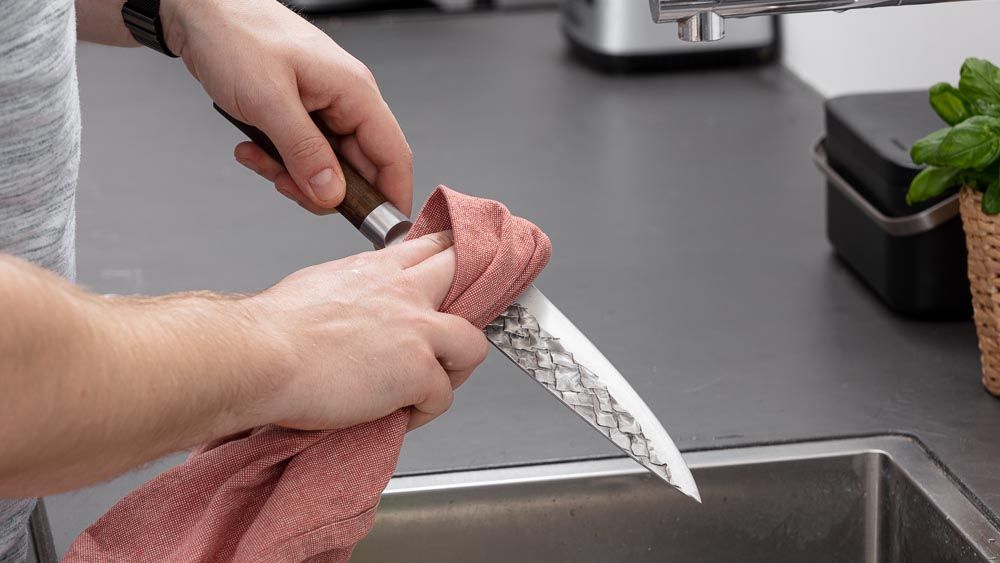Why Cleaning Knives Needs Special Care
German knives are known for their sharpness and durability. But to keep them in good shape, proper cleaning is very important. Never wash German knives in a dishwasher. The heat and soap can damage the blade. Instead, use warm water and mild dish soap. Gently wipe with a soft sponge after each use. Dry the knife immediately with a clean towel. This prevents rust and water spots. Do not leave it soaking in water. That can weaken the handle and blade. A well-cleaned german knives will last for years. Store it safely in a knife block or on a magnetic strip. Caring for your German knives ensures safety and great performance in every meal you make.
How to Wash Your Damascus Knife the Right Way
A Damascus knife is not only beautiful but also a high-performance tool. Because of its layered steel, it needs gentle care. Wash your Damascus knife by hand with warm water. Avoid using strong chemicals or harsh scrubbers. These can damage the steel pattern. Always dry damascus knife completely with a soft towel. Moisture can lead to rust and dullness. Oil the blade lightly after drying if you don’t use it daily. This keeps the Damascus steel from corroding. Never put this knife in the dishwasher. That can ruin its sharp edge and elegant look. With careful cleaning, your Damascus knife will stay sharp and stunning for years to come.
Why Your Cleaver Knife Needs Gentle Washing
A cleaver knife is strong and bold, made for chopping thick meat and bones. But cleaning it the wrong way can cause damage. Always clean your cleaver knife right after use. Use mild dish soap and warm water. Avoid using steel scrubbers, as they scratch the blade. Wipe gently with a sponge and rinse well. Dry the cleaver knife immediately to avoid rust. Don’t let it sit in the sink or water. If needed, oil the blade once a week for protection. Proper care keeps it sharp and prevents wear. A clean cleaver knife not only works better but also keeps your kitchen safe and hygienic.
Easy Cleaning Tips for a Damascus Knife Set
A Damascus knife set includes different blades for various tasks. But cleaning them wrong can harm their beauty and quality. Wash each knife in the set by hand, not in a dishwasher. Use warm water and a gentle sponge. Avoid strong soaps or bleach. Rinse each knife thoroughly and dry it right away with a towel. Don’t pile them up in the sink. That can dull the edges and cause accidents. Store the Damascus knife set in a wooden block or magnetic strip. Oiling the blades once a month adds extra protection. Clean and store your set properly for long-lasting sharpness and beauty.
Best Way to Clean a Nakiri Knife After Use
A Nakiri knife is perfect for slicing vegetables. Its thin, flat blade needs gentle cleaning to stay sharp. Always wash your Nakiri knife by hand after each use. Use warm water, a soft sponge, and light soap. Never use steel wool or harsh cleaners. These can scratch and dull the blade. Rinse well and dry it immediately with a cloth. Do not leave it in water or on a wet surface. That can cause rust or handle damage. A clean Nakiri knife gives you better control in the kitchen. Keep it sharp and shiny by cleaning it the right way every time.
How to Keep a Damascus Steel Knife Rust-Free
Damascus steel knives are known for their beautiful patterns and sharp blades. But they can rust if not cleaned properly. Always hand-wash your Damascus steel knife with mild soap and warm water. Avoid using a dishwasher, which can ruin the blade. Dry it immediately with a soft towel to prevent water spots. Store it in a dry place, away from moisture. Apply a light coat of mineral oil if you live in a humid area. This protects the blade from rust. With careful cleaning and proper storage, your Damascus steel knife will remain a stunning tool for everyday cooking.
What You Should Never Do When Cleaning Knives
Some cleaning habits can damage your knives forever. Never put any high-quality knives in the dishwasher. This includes German knives, Damascus knives, and cleavers. The high heat, detergent, and movement can ruin the edge and handle. Also, do not scrub with steel wool or rough pads. They scratch the surface and weaken the metal. Always wash knives by hand with mild soap. Dry them right away. Avoid soaking them in water for too long. That can damage both the blade and handle. With careful attention, you can keep all your knives—from the Damascus knife set to a Nakiri knife—in perfect condition.
Why Hand Washing Knives Is Always Better
Dishwashers might seem easy, but hand washing is better for your knives. This is true for all types—cleaver knife, German knives, or a Damascus steel knife. Dishwashers use strong chemicals and hot water that can harm the blade. Hand washing lets you control the cleaning process. Use mild soap, warm water, and a soft cloth or sponge. Clean your knife gently and avoid rubbing too hard. Dry it immediately with a towel to prevent rust or spots. With proper hand cleaning, your knives will last longer and perform better. It also helps to keep them looking new and shiny for years.
Storing Clean Knives the Right Way
After you clean your knives properly, storage is the next important step. A clean knife can still get damaged if not stored right. Never toss knives in a drawer. That can dull the blade and cause injuries. Use a magnetic strip, knife block, or blade guard for safety. If you’ve just cleaned your Damascus knife set, make sure it’s completely dry before storage. Moisture can cause rust, even on strong steel like German knives. For a cleaver knife or Nakiri knife, wrap it in a soft cloth if not used daily. Safe storage keeps your knives sharp and ready for any task.
Keep an eye for more latest news & updates on NY Heading!



